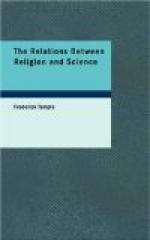And this agrees with the result of a careful examination of the facts of human consciousness from the opposite point of view. We cannot but acknowledge that when we look very closely we find a very large proportion of our own actions to be by no means the result of an interference by the will. A large proportion is due to custom; a large proportion to inclination, of which the will takes no special notice, and is not called on by the conscience to notice; a large proportion to inclinations which we know that we ought to resist, but we do not resist; a much smaller proportion, but still some, to passions and appetites against which we have striven in vain; only a very small proportion to deliberate choice. There is, in fact, no irresistible reason for claiming freedom for human action except when that action turns on the question of right or wrong. There is no reason to call action free that flows from inclination or custom, or passion, or a desire to avoid pain, or a desire to obtain pleasure. The will claims to be free in all these cases, but it is free in the sense that it might be exerted; and so, since it is not exerted, the action is not free. But when, at the call of duty, in whatever form, the will directly interferes, then and then only are we conscious not only that the will is free, but that it has asserted its freedom, and that the action has been free also.
The relation of the will to the conduct falls under four distinct heads: for sometimes the will simply concurs with the inclination; sometimes it neither concurs nor opposes; sometimes it opposes but is overpowered; sometimes it opposes and prevails. In the first case, inclination of some kind or other prompts the man to action. The inclination, whether set up by an external object of desire or by an internal impulse of restlessness or blind craving or the like, comes clearly from the nature, and is not free choice. There is no reason to believe that it is not in most cases, possibly in all cases, under the dominion of fixed law. It may be as completely the product of what has preceded it as the eclipse of the sun. And if the will concurs in the inclination, it is needless to discuss the question whether the will acts or not. The conduct is the same whether the will adds force to the inclination or is simply passive. The freedom of the will may in this case be considered as negative. So, too, may the freedom of the will be considered negative in the second case, which is that of the will neither concurring with inclination nor opposing it. In this case there may be a distinct consciousness of freedom in the form of a sense of responsibility for what inclination is permitted to do. A man in this case knows that he is free, perhaps knows that he ought to interfere and control the conduct. But as he does not interfere, the freedom of the will is not asserted in act. And it is possible that, as far as all external phenomena are concerned, there may be no breach in uniformity




